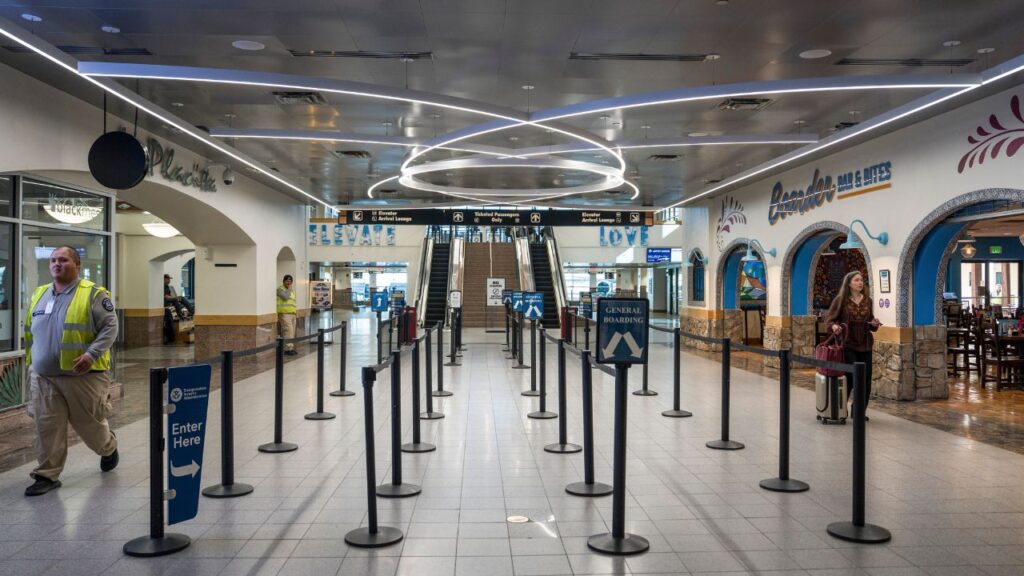Share
Every two weeks, cars line up at The Hill Church in Vallejo for a drive-thru food distribution. While Whitney Houston songs play over a speaker, volunteers load 39 pounds of food into each trunk — canned tuna, eggs, potatoes and other staples.

Rya Jetha
CalMatters
Elvira Santiago, a retired medical assistant living in senior housing, is particularly excited about the bag of apples.
“We eat them every afternoon. And I’ll cook chicken adobo with the chicken and vegetables,” said Santiago, who visited the distribution Wednesday for the first time this month and expects to return again. “When you go to Savers or the Filipino grocery, $50 is hardly enough.”
Santiago is one of the thousands of Californians visiting food banks this year, some for the very first time. The Food Bank of Contra Costa and Solano, which organizes the Vallejo distribution, is serving 350,000 people every month across the two counties — double the 175,000 people it served per month before the pandemic.
“With inflation going up and CalFresh food assistance going down, I see people in their 20s to people of retirement age all coming out for help,” said Geo Dinoso, who manages distributions for the food bank. “I’m requesting more food every month at my distributions.”
California food banks, which saw more families seeking help during the pandemic, are now serving more people every month as extra benefits started during the pandemic come to an end. That is reducing benefits to 5.3 million Californians — and prompting the statewide food banks association to warn of a “catastrophic hunger crisis” this year.
Instead of functioning as sources of emergency aid, food banks say they are becoming long-term supermarkets for Californians facing food insecurity.
Recipients of CalFresh, California’s version of the federal food stamp program, were given the maximum benefits available for their household size during the pandemic, or at least $95 more a month if they were already at the maximum. However, those emergency allotments ended March 26, meaning that for some single-person households, CalFresh benefits dropped from $281 to as little as $23 a month.
Also, a federal program that gives eligible households food benefits to replace in-person school meals will conclude at the end of this school year. While a summer program will replace it, the benefit will be $40 per month for each child, a substantial drop from the $125 per month for each child families received last summer.

Now, food banks are also worried about the federal debt ceiling agreement, which imposes more work requirements on food aid recipients.
“Often when people receive less CalFresh benefits or are kicked off the program more permanently, they turn to food banks to make up the difference. So we’re concerned about what the debt ceiling agreement will mean for food banks,” said Lauren Lathan Reid, director of communications at the California Association of Food Banks.
That surge in demand is already happening at Sacramento Food Bank & Family Services, which in 2023, has already had two of its five busiest months ever. In March and April, it served 305,000 and 280,000 people, respectively. Before the pandemic, the food bank served around 150,000 people per month.
“We don’t see an end in sight for this sustained hunger,” said Kevin Buffalino, the food bank’s communications director. “And if this is sustained, it is going to be very difficult for us to keep up.”
Food Banks Flooded With Families
The number of people served at Sacramento’s food bank nearly doubled from 2019 to 2023 — similar to what food banks are seeing across California.

Other food banks in Northern California have seen similar spikes in demand. Berkeley Food Pantry, which serves families in Berkeley and Albany, has seen a 56% increase in demand in the first five months of 2023 compared to 2019.
Dharma Galang, director of the Berkeley Food Pantry, traces this increase in demand to a letter CalFresh recipients received in January informing them that emergency benefits would be scaled back in March.
Since then, the pantry has been running out of fresh vegetables, meat, eggs and dairy products — nutritious foods that are often more expensive at groceries.

Across the Bay, the San Francisco-Marin Food Bank is serving 56,000 households per week compared to 32,000 households before the pandemic. The programs it offers, including neighborhood pantries and home-delivered groceries, are at or over capacity, with long waiting lists.
“To deal with this, we’ve had to scale back and simplify our menus,” said Meg Davidson, the food bank’s policy and advocacy director.
The food bank also works with a multilingual outreach team that helps people sign up for CalFresh benefits. Since March, many people have stopped applying for CalFresh because the benefits have reduced so drastically.
“To go from $281 to $23 a month is devastating, you cannot come back from that,” Davidson said. “In a place like the Bay Area, the benefit allotments are completely out of touch with reality.”
Even with the extra benefits during the pandemic, 20% of Californians still faced food insecurity in 2021. This year, the number is expected to rapidly rise.
From experiences during the 2008 Great Recession and recent survey results from food banks, Reid of the state association anticipates an increase in demand for food for many years to come.
Solutions at the Capitol?
There are efforts underway at the Legislature to increase the minimum CalFresh benefit. Senate Bill 600, authored by state Sen. Caroline Menjivar, raises the amount from $23 to $50 per month.
“I know $50 isn’t enough. New Jersey has $95, and their cost of living is nowhere near ours,” said Menjivar, a Van Nuys Democrat.
The bill, however, is estimated to cost $95 million a year, a steep price tag amid California’s $31.5 billion budget deficit.

Food banks across California are in favor of this bill, in addition to SB 348, which would ensure access to summer food and school meals programs, and SB 245 and Assembly Bill 311, which would provide state-funded nutrition benefits to all Californians regardless of their immigration status.
“We’re heartened to see that lawmakers at the state level have been acknowledging that this hunger crisis is still going on,” said Davidson of the San Francisco-Marin Food Bank. “We’ve been seeing the exact opposite at the federal level with Congress holding the debt ceiling hostage over SNAP restrictions, and unfortunately we’re seeing it from our local government.”
All four bills have passed their first house, but could face hurdles to become law as the Legislative Analyst’s Office warns that the state cannot afford costly new programs.
Gov. Gavin Newsom’s May budget plan includes $60 million for CalFood, which enables food banks to distribute California-grown produce; more than $300 million for School Meals for All; and a total of $2.7 billion in combined state and federal funding for anti-hunger programs.
The budget does not include any money for Market Match, California’s largest nutrition incentive program that allows CalFresh shoppers to double their benefits on fruits and vegetables at farmers’ markets across the state. This has sparked concern from farmers, food banks, and CalFresh recipients who obtained 38 million servings of fruits and veggies through the program.
Newsom’s plan also does not include money to increase the monthly minimum CalFresh allotment, and Menjivar said it will be a challenge to get it included.
Food banks are continuing to advocate for the bill to be in the final budget, which is now being negotiated, with a June 15 deadline for the Legislature to pass at least its version.
“Levels of hunger during the pandemic did not significantly spike, and that was only because we had public programs and food banks that stepped up. If we don’t continue to have investments from the state and federal governments, then all the weight is going to be put on food banks,” said Reid.
For now, people from all walks of life will continue to line up in their cars at the Vallejo food bank. Alvin Angeles, a 32-year-old caretaker in Vallejo who just had a baby, will wait in his car alongside Dave Terry, a 64-year-old on disability.
“It’s a sad thing to see in our United States of America,” said Terry. “I don’t see an end in sight. We need a lot of policy changes.”
About the Author
Rya Sara Jetha is a recent graduate of Pomona College, where she earned degrees in politics and history. At Pomona, Rya worked for the college newspaper, led the college’s judicial system, and served as the editor-in-chief of the undergraduate law journal. Rya was a Dow Jones News Fund business reporting intern last summer at Bay City News, and joins CalMatters for the summer as a Dow Jones News Fund digital media intern.
CalMatters is a nonprofit, nonpartisan newsroom committed to explaining California policy and politics.



















